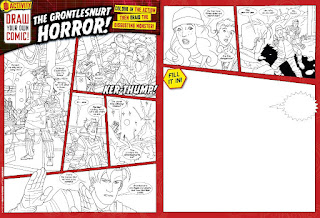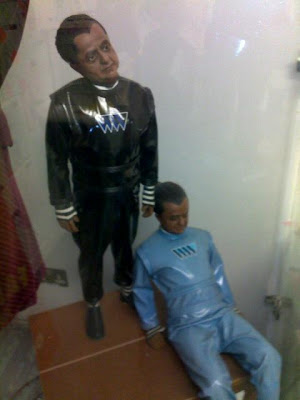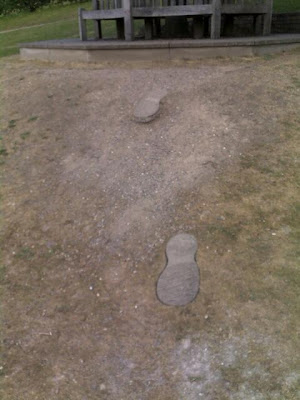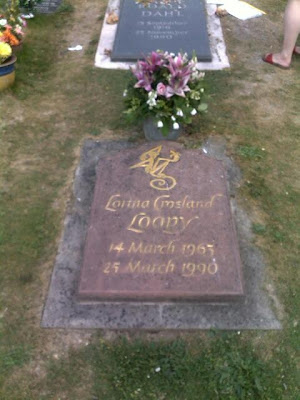 |
Alex Mallinson's beautiful cover for
Doctor Who: Short Trips -
How The Doctor
Changed My Life. |
Five years ago today, on 19 June 2007, the BBC's official
Doctor Who site announced the winners of a short story competition that I'd judged. The winning stories, all by first-time fiction writers, were later published by
Big Finish as
How the Doctor Changed My Life.
I wrote some
general feedback on the more than 1,000 entries received, which might help would-be writers of
Doctor Who stories.
The book we produced is now sadly out of print - and commanding a small fortune second-hand. But I'm really proud of it, and the hard work the writers put into it.
Anyone could enter who'd never been paid to write fiction before - they might have been paid for non-fiction and/or they might have written fiction for free. My hope was that it might encourage people who'd always meant to write to actually do it, and might even act as a springboard for writing careers. (My own first paid-for work of fiction was in Big Finish's first
Short Trips book,
Zodiac, in 2002.)
So what have the 25 authors been up to since?
Our overall winner was Michael Coen. Soon after
HTDCML, he had a short story, “Ivory”, accepted in the
Pantechnicon Book of Lies - but that book sadly never saw publication. “I’m still writing,” says Michael. “I’ve finished one ‘genre’ novel which I’ve sent to a couple of publishers with ‘open submission’ windows and I’m working on my second which is more mainstream. I still get a tremendous thrill from being a published author and haven’t given up on making some sort of breakthrough in the future.”
Simon Moore writes the world's leading
14 line rhyming review portal (as recently featured in the
Guardian), and his historical murder mystery was in the long-list of 20 in the CWA's Debut Dagger competition for new writers. Simon tweets at both
@asimonmoore and
@sonnetreviews.
Mike Amberry's
Doctor Who short story “Trial by Fire” was published in
Doctor Who: Short Trips – Indefineable Magic (one of seven
HTDCML authors to appear in that book). “Oyun” was published in the
Mythmakers collection Pseudoscope. Mike has also written a novel “which I will be polishing up this year in the hope that I might interest someone with it. My current project is a short ghost story, even though I've so far failed to get the previous ghost story I wrote published!” He is on Twitter as
@mikeamberry.
Stephen Dunn's
Doctor Who story, “Once Upon a Time Machine” was published in
Indefineable Magic. “Being published again proved - to me at least - that the first story had not a complete fluke. At the moment I am trying to in-doctor-inate my 20 month old daughter Anya Charlotte Eloise in the ways of
Who. I have lots of
Doctor Who short stories in my head, which I will be sharing with her when she is a little older.”
Bernard O'Toole was a winner of the
BBC writers' room “Sharps” competition in 2008, which led to a couple of script commissions and helped get him an agent. He's reached the offers stage for radio drama a couple of times and has a feature script in development. “I constantly write spec scripts and pitches and still apply for competitions,” he says. “In recent years I’ve reached the final stages of competitions like
Red Planet, the Alfred Bradley Bursary Award (BBC radio drama) and even
Writers' Academy but haven’t landed the top spot. That said, every little victory keeps the moral up and the ideas flowing. It’s still good fun at the end of the day.
HTDCML was a major thing for me. Like all of us brought up on the Target paperbacks, which during my childhood meant everything to me, to have a few pages of published Doctor Who prose was a major ambition. I glance up at it now on the book shelf as I type this and it always makes me smile. Good times indeed.”
LM Myles had a short story,
“Missing In Action”, published in the e-zine
Reflection's Edge, and another one, “The Better Part of Valour”, in the
Bernice Summerfield anthology Present Danger. Her essay “Renaissance of the Fandom” was included in the Hugo Award-winning
Chicks Dig Time Lords and she is co-editing
Chicks Unravel Time – Women Journey Through Every Season of Doctor Who, due out in November. She is also on Twitter as
@LMMyles.
Michael Montoure has written two anthologies of horror stories,
Counting from Ten and Other Stories and
Slices, and is co-writing the web series
Causality. He's on Twitter as
@Montoure.
Tim Lambert's story “Automatic Head Spin” appeared in online sf, fantasy and horror magazine,
Allegory in 2011. “This has definitely given me a renewed sense that I must be doing something right,” says Tim, who's continuing to send out stories.
Richard Goff had not, at time of writing, responded to my email.
Caleb Woodbridge's
Doctor Who short story, “Blessed are the Peacemakers” was included in
Indefineable Magic. He is currently seeking publication for his first novel. He's an editor of the
Impossible Podcasts and also writes
A Journal of Impossible Things, a blog about fiction, fantasy and faith. He's on Twitter as
@CalebWoodbridge.
Chris Wing says his next bestselling novel now has a tentative name -
The Secret of the Spires – but “still needs to be written”. He is also writing
Doctor Who stories exclusively written for his kids. He says that “Doctor Who and the Missing Girl was a hit amongst the two-strong audience a few bedtimes ago”. He's on Twitter as
@chriswing1977.
Mark Smith, uniquely of the
HTDCML authors, employed me – commissioning some articles for the
Herald.
James C McFetridge's novel
Unendlicher Tod is published in Germany this August, and his agent is currently pursuing publishers in the UK. It was also shortlisted in the To Hell With Prizes Award 2011.
Einar Olgeirsson has, at time of writing, not responded to my email.
Matthew James's
Doctor Who short story, “Hiccup in Time”, was published in
Indefineable Magic. You can read more of his stories on
his website. Matthew says: “I have had a little more luck with short film scripts which I've put together for student film projects. I've done three of these and they've been fun. I'm now working on a theatre play which is proving interesting but difficult! Inspired by the student films I'm also putting together a short of my own but time to work on these projects and earn money in the 'real world' mean progress is slow. But thank you Simon, Neil Corry and Big Finish for giving me that one break! Lack of success has never stopped me writing before or since, but it is wonderful to know that some tiny piece of it is out there, published, in the best of all places - the Doctor Who universe.”
Violet Addison has been published in
Faction Paradox: A Romance in 12 Parts, as well as the
Mythmakers anthology
Pseudoscope. This year, she appears in the
World's Collider anthology, and has her first original audio piece,
Walking with Dragons. She says she is “pitching like mad and entering every competition I can find. I'm still getting about ten rejections for every one thing that gets through though.”
Andrew K Purvis had a short story, “Go Fourth”, published and promises to finish a novel this year.
Nick May had, at time of writing, not responded to my email.
Steven Alexander has written a 100,000-word novel and taken part in more writing competitions. He's also writing for the
Planet Skaro Audios.
JR Loflin's “Breath of Echoes” was published in the
Mythmakers anthology,
Pseudoscope.
Mike Rees'
Doctor Who short story, “The Science of Magic”, was published in
Indefineable Magic. His novel
Broken Heroes is available to buy as a
print version and
electronic version, and you can preview the chapters at
http://brokenheroesnovel.wordpress.com/.
Dann Chinn continues to write. The most solid evidence of this can be found at the recently-revived
Misfit City music blog. He's also on Twitter as
@dannchinn.
John Callaghan's story, “Have You Tried Turning It Off and Then Back On Again?”, was published in
Indefineable Magic. He is currently touring in the two-person comedy musical
We Won't Rock You and says his main creative focus is his solo music – such as featured in this
video. “I'm finishing the new album I've been working on, on and off, for at least five years now,” says John. “I've assembled all the musical parts and now it just needs mixing. I'm not accustomed to being so busy, so I'm having to fit it in between rehearsals for Brighton and doing the odd remix and live solo show.”
Arnold T Blumberg's
Doctor Who short story, “Mardi Gras Massacre”, was published in
Indefineable Magic. Arnold has set up his own company, ATB Publishing, whose first book will be
Red, White and Who: The Story of Doctor Who in America.
Anna Bratton has collaborated with Brittney Sabo, on a young adult graphic novel,
Francis Sharp in the Grip of the Uncanny! “We received a Xeric self-publishing grant in 2010 and released Book One the same year. Currently, I am writing Book Two and noodling around with upcoming
Doctor Who-related projects.”
The
Doctor Who Short Trips books came to an end a year after the publication of
How The Doctor Changed My Life, but production company Big Finish continues to produce
audio Short Trips, and has run a number of writing competitions since I ran this one.



















